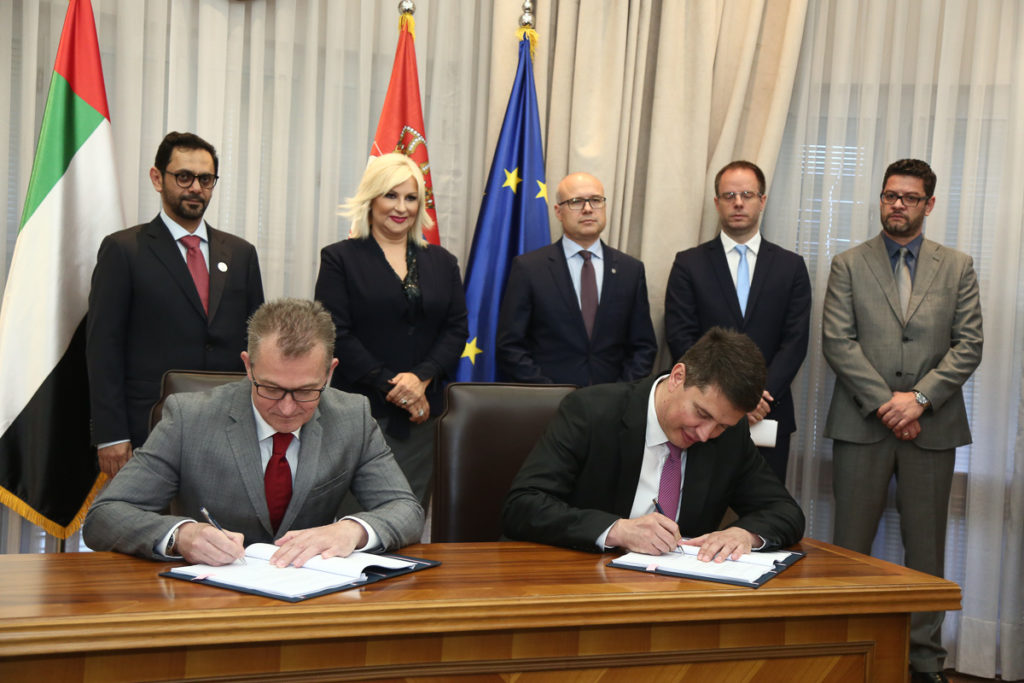P&O Ports has announced a Public-Private Partnership (PPP) agreement to operate the port of Novi Sad, Serbia as part of a long-term investment plan to upgrade equipment and services and to support the Serbian government’s strategy to create an intermodal terminal and logistics centre with rail, road and inland waterways links to the rest of Europe.
The agreement shall grant a right to P&O Ports to operate Novi Sad for an initial 25 years with an option to renew by both parties for another 25 years on expiry. The SPA for obtaining the property rights on the capital and assets of the port operator of the Port of Novi Sad was signed today by Dragan Stevanovic, State Secretary of the Ministry of Economy and P&O Ports Chief Executive Officer, Rado Antolovic following a Memorandum of Understanding signed last year by Deputy Prime Minister Mrs. Zorana Mihajlovic and Mr. Sultan Ahmed Bin Sulayem, Chairman of P&O Ports.
The Port of Novi Sad is located on a 24-hectare site on the Danube river and it is operated by the last remaining port operator in the country owned and operated by the government with an estimated throughput of around 1 million tons a year. P&O Ports will retain exclusive rights to undertake all waterside operations, container handling, project cargo and fertilizer activities. The current quay is 500m long and features include cargo handling, warehousing facilities, storage of bulk cargo and general cargo connections to the national railway network. The development plan will include construction of 189 meters of new vertical quay wall, new silo capacities, new handling equipment and refurbishment of existing machinery plus installation of a terminal operating system. In partnership with the Serbian Ministry of Construction, Transport and Infrastructure the possibility of construction of the container terminals will also be considered.
P&O Ports Chairman, Sultan Ahmed Bin Sulayem, said: “The Port of Novi Sad provides connections with DP World Constanza, Romania, with onward handling of bulk cargos in Jebel Ali Port, Dubai. It also has capacity to connect with our operations elsewhere adding value to customers and our partners in getting goods to local, regional and international markets. There is also an opportunity to handle bulk commodities in the steel and construction sectors, food and coal.
“This agreement is another example of our strategy to provide further services across the global supply chain, creating efficiencies of our customers and supporting the development of nations. By linking with our operations across Europe we can provide further added value through Novi Sad. We appreciate the commitment of the Serbian President Mr. Vucic and the Deputy Prime Minister Mrs. Zorana Mihajlovic to the development of the Serbian port system and their understanding of the great importance of the Danube as one of the key logistic hubs in Europe providing connectivity by road, rail and inland waterway transport through inland ports along the river.”
Cereals are the largest export commodity of Serbia and the World Bank has projected increasing GDP growth of 4% from 2020 for the next decade. Major trade partners include all European countries with China being the third largest import partner. Exports are transported to markets primarily by barge out of river ports on the Danube with cargo being transported to Constanza in Romania and shipped to the Middle East and other ports. Trucking is focused on the local and regional market and export via Adriatic ports.

